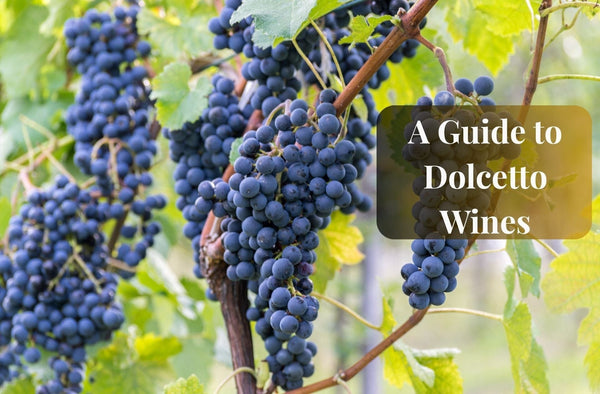A Guide to Dolcetto Wines

Discover the charm of Dolcetto wines, from Piedmont’s hillside vineyards to Sonoma’s cool valleys. This guide explores the grape’s rich history, flavor profile, and top bottles available at Bottle Barn, including both traditional Italian favorites and a rare Sonoma-grown gem. Whether you’re looking for an affordable everyday red or something more cellar-worthy, these Dolcettos are full of character and perfect for pairing with food.
……………
Dolcetto sounds enticing as a wine, and indeed it is!
The Dolcetto grape is native to Italy’s Piedmont region. The resulting wines have a history dating back to at least the 16th century. Despite its name—meaning “little sweet one”—the grape produces dry, often tannic wines with modest acidity and flavors of black cherry, licorice, and almonds. It’s truly delicious!
Also Read: What are Tannins in Wine?
It has long been favored by Piemontese growers for its early ripening. The grape is ideal for higher, cooler sites. Historically, Dolcetto thus served both as a reliable local table wine and a commercial fallback in vintages too cold for Barolo or Barbaresco.
When you buy wine online, remember that its stronghold remains in appellations such as Dogliani and Dolcetto d’Alba. Here, traditional winemaking practices emphasize freshness and youthful fruit, though modern producers increasingly explore structured, age-worthy expressions. Dolcetto too is grown right here in Sonoma!
While Dolcetto never achieved the international renown of Barbera or Nebbiolo, it remains a cornerstone of Piedmont’s wine culture, marking its regional identity. And it’s hard to go wrong with Piedmont in terms of great Italians wines available online!
But will you like it?
What Does Dolecetto Wine Taste Like?
Dolcetto wines typically display a deep ruby-purple color, often more intense than Barbera despite their generally lighter body. Aromatically, they offer an inviting mix of ripe black fruits (think black cherry, plum, and blackberry), accented by notes of violets, licorice, and possibly bitter almond or earthy spice.
In your mouth, Dolcetto is usually dry, with low to moderate acidity and firm, sometimes rustic tannins. This gives the wine grip despite its soft, plush fruit. The best examples balance a supple texture with a very slightly bitter finish. Fear not! This actually enhances food pairing, especially with northern Italian dishes. While these days most Dolcetto is made for early consumption, wines from superior sites or structured styles—particularly in Dogliani Superiore or select Dolcetto d’Alba bottlings—can develop savory complexity and mellow tannins with a few years of aging. Check out the Cascina Penna-Currado mentioned below.
A Geosensorial Appreciation of Dolcetto
Not everyone, of course, agrees about a wine’s aromas and flavors.
The Geosensorial method, developed by French oenophile Jacky Rigaux, approaches wine as an expression of place, privileging sensory immersion and emphasizing texture, energy, and balance over analytic tasting description.
From this perspective, Dolcetto wines from terroir-driven appellations like Dogliani or Dolcetto di Diano d’Alba appear as grounded, direct, and forthright, with a tactile signature that reflects their hillside origins and marl-rich soils. Dolcetto thus has a dense yet fluid texture, with firm but integrated tannins, and the subtle bitterness that gives it a “horizontal” persistence on the palate, spreading broadly rather than rising vertically like Nebbiolo.
The aromas—dark fruits, crushed violets, and earthy undertones—come from the place, the terroir, revealing a wine that speaks very much of soil and exposure. In this sensibility, Dolcetto expresses not just flavor but atmosphere—a rustic, shadowed elegance shaped by the Piedmontese (or Sonoma) landscape.
Also Read: Best Sonoma Wineries for First-Time Visitors
Top Recommended Dolcetto Wines
The hand-curated selection of Dolcetto wines lets you explore the full range of this marvelous grape when you shop wine online.
Several standout Dolcetto wines available at Bottle Barn showcase the grape’s versatility across both Italian and Californian terroirs. The 2018 Mengler Family Wines Alegria Vineyards Dolcetto ($37.99), grown in Sonoma’s Russian River Valley, offers a rare New World expression. The cool-climate site, with morning fog and Goldridge soils, lends lift and elegance to the wine, which emphasizes bright plum, wild herbs, and velvety tannins, demonstrating how Dolcetto can adapt outside its Piedmontese home while still honoring its structural identity.
Moving to Italy, the 2022 Brovia Dolcetto d'Alba Vignavillej ($20.49) hails from a well-regarded Barolo estate. Grown on lighter, sandy soils in Castiglione Falletto, this wine shows floral aromatics, juicy black cherry fruit, and a fine mineral thread, emphasizing vibrancy over density. The 2021 Ceretto Dolcetto d'Alba Rossana ($18.99), from a vineyard near Alba with clay-limestone soils, delivers a riper, more polished profile with notes of blackberries, licorice, and a gentle earthiness, highlighting Ceretto’s refined house style.
The best online wine store also offers a more structured and terroir-driven expression, the 2023 Cascina Penna-Currado Dolcetto d'Alba Bricco Lago ($64.99). This is a true stand out. Grown at higher elevation on steep marl slopes, this wine earns high marks from wine critics for its concentration, savory depth, and age-worthiness. This wine represent an excellent example of Dolcetto with high ambitions. The 2023 Domenico Clerico Dolcetto Visadi ($19.99), sourced from Monforte d’Alba, offers a denser, darker wine with muscular tannins and a brooding finish, shaped by the compact clay soils of the southern Barolo zone. Bottle Barn’s online liquor store always has the best prices!
The 2023 Cantina del Pino Dolcetto d’Alba ($17.99) delivers classic Dolcetto character at great value. From vineyards near Neive, where sandy and limestone-rich soils produce supple, fruit-forward wines, this bottling shows fresh red berries, violet, and a clean, almond-tinged finish. Finally, the 2020 Ca del Bric Mayno Zero Dolcetto ($17.49), made without added sulfites, reflects a “natural wine” approach from the Monferrato area. Its generous fruit, soft tannins, and earthy purity make it an approachable, everyday Dolcetto grounded in the traditions of southeastern Piedmont.














Leave a comment